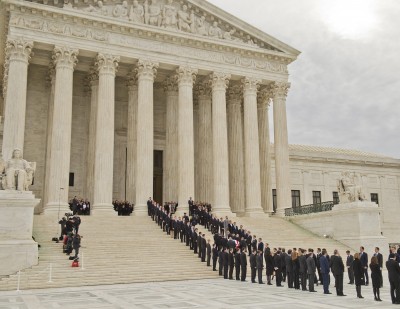
By PETER THOMAS
Copy Editor
Several weeks ago, the death of Justice Antonin Scalia briefly stole the national spotlight from the ongoing presidential primaries, with analysts turning their attention towards the prospects of the Supreme Court of the United States (SCOTUS) after the death of one of its most conservative justices.
At the time, Mitch McConnell, the leader of Republican-controlled Senate, the body responsible for confirming presidential nominees to the Court, publicly and vociferously advocated what has become the hallmark of the GOP – legislative obstruction – vowing not to approve any nominee to the Supreme Court until after the election this November.

His voice was joined by others, including that of Republican Senator Orrin Hatch.
The Republican Senator’s blatant, though not at all unexpected, abdication of his constitutionally-mandated duty was met with resounding support from many of his constituents, who hope for a GOP victory in the presidential election and, thus, a conservative nominee for the Supreme Court.
Among those constituents was Texas Senator and current Republican presidential candidate, Ted Cruz, who argued that “It’s been over 80 years since a lame duck president has appointed a Supreme Court justice” in an attempt to justify McConnell’s and his own obstructionist policies. Senator Cruz, however, erroneously applied the “lame duck” period to the entire last year of Obama’s presidency when, in reality, the term applies only to the time during which an incumbent president holds office after the election of a new executive until the latter’s inauguration.
While Senator Cruz’s argument is factually void, so too is the belief that President Obama can wholeheartedly condemn Cruz, McConnell and any other Republican obstructionist in this scenario.
Indeed, as a Senator, President Obama urged his Democratic colleagues to block the 2005 nomination of conservative Justice Samuel Alito, using rhetoric that is unnervingly similar to that which now obstructs his agenda.
Regardless of the threats issued by most Republicans to impede the judicial nomination process, last Wednesday, March 16, President Obama revived the mainstream conversation about the SCOTUS vacancy by propounding Merrick Garland as one who may be the first of many nominees.
Garland himself is a moderate, an unabridged centrist with no ostensible partisan leanings.
According to the New York Times, Garland has sided with the government on issues of habeas corpus, voted against criminal defendants more frequently than his liberal constituents and deferred many decisions to the established policies of federal agencies, rather than overtly remaking or bolstering those policies.
With such a neutral judicial record, Garland is the nominee that neither avid liberals nor avowed conservatives would like to see sitting on the bench of the highest court in the land.
Nonetheless, Garland’s nomination might just mark a pragmatic turning point in American politics: a thawing of the apparent permafrost that separates Republicans and Democrats by appealing to the sensibilities, not the dogmas, of America’s statesmen and population as a whole.
By nominating a moderate, even when more liberal candidates, including Sri Srinivasan and Patricia Ann Millett, qualified for the president’s “shortlist,” according to CNN, Obama does appear concerned more with the health of the federal government and the integrity of his presidential legacy than he does with a liberal agenda.
Perhaps Justice Garland will not provide the votes necessary for progressive rulings regarding abortion, capital punishment and gun control; perhaps Justice Garland will not satiate FOX News’s desire to issue fallacious and nonsensical attacks on liberals.
But perhaps Justice Garland will represent the first high-profile figure to make pragmatism, not dogmatism, the foundation for twenty-first-century American democracy.
It may be idealistic to believe that American politics can be cured of the varied tumors that afflict it, especially as the result of a single SCOTUS nomination that still is not assured to be confirmed, but it is not beyond the realm of reality that moderates from both sides of the aisle will be able to establish the foundations for future bipartisan cooperation by approving Justice Garland.
Pundits at the Washington Post, New York Times and Huffington Post have claimed that Justice Garland, and, by extension, President Obama, may yet prevail given the intense (and bipartisan) discontent with congressional obstinacy, which will likely encourage Republicans and Democrats who currently oppose Garland to eventually support him in order to enhance their chances of reelection.
Given that Garland, if confirmed, would occupy a bench seat formerly held by Antonin Scalia, one of the Court’s most prolific conservatives, it would be difficult for him to maintain the judicial paradigm established for the past decade or so.
Garland would likely, though not invariably, shift SCOTUS towards the left, according to the New York Times, but not on every issue. For instance, Justice Garland has previously “recommended that the government seek the death penalty” in cases of national importance and great public consequence.
Ultimately, any SCOTUS nomination should not be an issue of agenda or party loyalty, but one of practicality.
Justice Garland would make a perfectly practical, if not excellent Supreme Court Justice: according to well-respected Senator Hatch, “his intelligence and his scholarship cannot be questioned… [and] his legal experience is equally impressive.”
Certainly, Senator Hatch’s characterization of Garland is well-founded; it is a shame that the Senator himself is committed to obstructing the nomination process.














